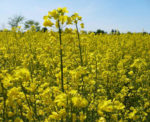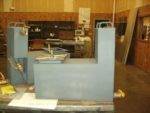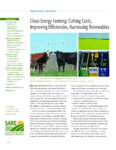The educational materials listed on this page are about Anaerobic Digestion.
Anaerobic digestion is a process of composting in which the materials are broken down under conditions that lack oxygen. The process is used for industrial or domestic purposes to manage waste or to produce fuels. Anaerobic digestion energy is one form of alternative energy that utilizes a vessel or digester, called an anaerobic digester, to convert biomass into a biogas. Anaerobic digesters can also be fed with energy crops such as corn. Facilities that recycle nutrients often have a biogas generator in addition to a biogas digester or a methane digester. Key practices include byproduct utilization, bioenergy and biofuels, anaerobic digestion, biodiesel, biofuel feedstocks, nutrient cycling, municipal wastes, renewable energy.
SARE’s book Building a Sustainable Business can aid producers in building both a sustainable and profitable business plan that includes renewable energy and biofuel created from anaerobic digestion processes. The SARE bulletin Clean Energy Farming: Cutting Costs, Improving Efficiencies, Harnessing Renewables helps farmers utilize clean energy practices on their operations and recycle nutrients. Utilizing this resource may help you implement farming practices that both save energy and protect natural resources, and produce and use renewable fuels. The Farm Energy Topic Room provides a wealth of information on clean energy topics, including biodiesel, farm energy audits, solar and wind energy, and more.
Showing 1-3 of 3 results

Sustainable Production and Use of On-Farm Energy
Using solar or wind energy or producing biofuels from crop feedstocks and anaerobic digestion helps farmers achieve energy independence while improving profitability and reducing fossil fuel emissions.

Small-Scale Biogas Technology
This website has information on technology for turning organic waste into biogas for small-scale, on-farm energy applications.

Clean Energy Farming
Clean Energy Farming: Cutting Costs, Improving Efficiencies, Harnessing Renewables features innovative SARE-funded research and examples of farmers who are improving energy efficiency while saving money, implementing farming practices that both save energy and protect natural resources, and producing and using renewable fuels.